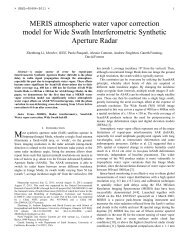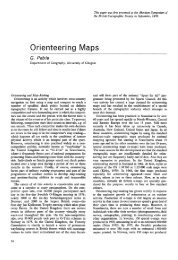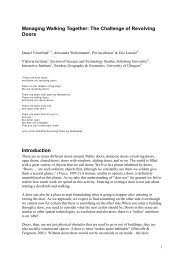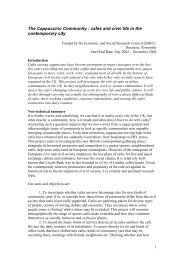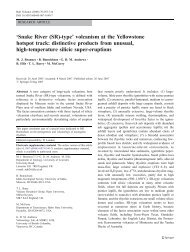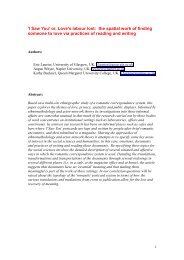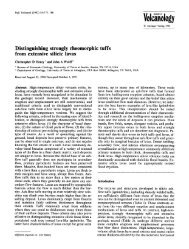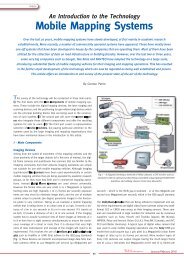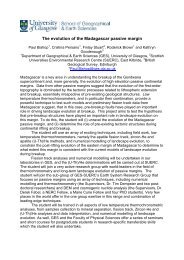Café Ethnography : the uses of tables and chairs
Café Ethnography : the uses of tables and chairs
Café Ethnography : the uses of tables and chairs
You also want an ePaper? Increase the reach of your titles
YUMPU automatically turns print PDFs into web optimized ePapers that Google loves.
<strong>Café</strong> <strong>Ethnography</strong>:<br />
provision <strong>of</strong> food <strong>and</strong> non-alcoholic hot drinks. Meanwhile many cafes have sought<br />
licenses to sell alcohol <strong>and</strong> extended <strong>the</strong>ir evening opening hours (sometimes beyond<br />
those <strong>of</strong> bars). At <strong>the</strong> same time <strong>the</strong>re has been a more general boom in c<strong>of</strong>fee<br />
drinking at <strong>the</strong> expense <strong>of</strong> both tea <strong>and</strong> alcohol which has lead to numerous new<br />
franchises such as Costa C<strong>of</strong>fee, Starbucks <strong>and</strong> <strong>Café</strong> Nero opening places which<br />
might once again be called 'c<strong>of</strong>fee ho<strong>uses</strong>'.<br />
Historical sociologists such as Jurgen Habermas (1989) have rooted gr<strong>and</strong> claims<br />
about <strong>the</strong> rise <strong>of</strong> <strong>the</strong> public sphere in amongst <strong>the</strong> everyday world <strong>of</strong> c<strong>of</strong>fee ho<strong>uses</strong> in<br />
Britain, salons in France <strong>and</strong> Tischgesellschaften (table societies) in Germany. These<br />
were places, according to Habermas, where a new form <strong>of</strong> public life involving<br />
politics, letters <strong>and</strong> culture could emerge from <strong>the</strong> previous opposition between <strong>the</strong><br />
private realm <strong>of</strong> civil society <strong>and</strong> <strong>the</strong> family, <strong>and</strong> <strong>the</strong> public sphere <strong>of</strong> <strong>the</strong> state <strong>and</strong> <strong>the</strong><br />
court. Habermas points toward <strong>the</strong> manner in which periodicals such as <strong>the</strong> Guardian<br />
<strong>and</strong> <strong>the</strong> Spectator were thus intimately interwoven with <strong>the</strong> c<strong>of</strong>fee ho<strong>uses</strong> in <strong>the</strong> early<br />
18 th century, up to <strong>the</strong> point where letters to <strong>the</strong> editors <strong>of</strong> <strong>the</strong>se papers could be<br />
submitted directly at <strong>the</strong> c<strong>of</strong>fee ho<strong>uses</strong> (page 42). C<strong>of</strong>fee ho<strong>uses</strong>, as Habermas<br />
elegantly summarises -<br />
'… preserved a kind <strong>of</strong> social intercourse that, far from pre-supposing <strong>the</strong> equality <strong>of</strong> status ,<br />
disregarded status altoge<strong>the</strong>r. The tendency replaced <strong>the</strong> celebration <strong>of</strong> rank with a tact<br />
befitting equals. The parity on whose basis alone <strong>the</strong> authority <strong>of</strong> <strong>the</strong> better argument could<br />
assert itself against that <strong>of</strong> social hierarchy <strong>and</strong> in <strong>the</strong> end can <strong>the</strong> carry <strong>the</strong> day meant, in <strong>the</strong><br />
thought <strong>of</strong> <strong>the</strong> day, <strong>the</strong> parity <strong>of</strong> "common humanity". Private gentlemen made up <strong>the</strong> public<br />
not just in <strong>the</strong> sense that power <strong>and</strong> prestige <strong>of</strong> public <strong>of</strong>fice were held in suspense; economic<br />
dependencies also in principle had no influence. Laws <strong>of</strong> <strong>the</strong> market were suspended as were<br />
laws <strong>of</strong> <strong>the</strong> state. Not that this idea <strong>of</strong> <strong>the</strong> public was actually realized in earnest in <strong>the</strong> c<strong>of</strong>fee<br />
ho<strong>uses</strong>; but as an idea it had become insitutionalized <strong>and</strong> <strong>the</strong>reby stated as an objective<br />
claim.' Habermas (1989) page 36<br />
Picking up once again on <strong>the</strong>se utopian qualities <strong>of</strong> cafes though this time with<br />
reference to 19 th century working class cafes in France, Haine (1996) proposes <strong>the</strong><br />
ideal <strong>of</strong> a café <strong>of</strong> that place <strong>and</strong> period -<br />
'The café provided an opportune space in which to create relations based on spontaneous<br />
solidarity. This fleeting fraternity rested on three values . The first was selectivity - that is,<br />
<strong>the</strong> freedom <strong>of</strong> participants in café sociability to converse with whomever <strong>the</strong>y wished. The<br />
second value was autonomy - <strong>the</strong> right not to be interrupted by third parties once you had<br />
begun to talk with a particular person or group. The third involved <strong>the</strong> idea <strong>of</strong> tolerance - that<br />
is, <strong>the</strong> concept that no one in <strong>the</strong> café should take <strong>of</strong>fense at <strong>the</strong> minor irritations <strong>and</strong> insults<br />
that accompanied socializing in a small space amid a dense urban agglomeration.' (page 150)<br />
From even this very brief reading <strong>of</strong> <strong>the</strong> socio-historical literature on cafés we can get<br />
a sense <strong>the</strong>n <strong>of</strong> cafés as places where social status is on a quite different footing than<br />
in a palace, council chamber or family kitchen. They are public places where common<br />
codes <strong>of</strong> conduct are adhered to, informal <strong>and</strong> yet as Haine hints <strong>the</strong>re are values<br />
specific to <strong>the</strong>m as places <strong>of</strong> that type which guide norms <strong>of</strong> behaviour for <strong>the</strong>ir<br />
customers 3 .<br />
3<br />
And as Habermas might point out make <strong>the</strong>m 'customers' ra<strong>the</strong>r than say 'citizens', <strong>and</strong> thus involved<br />
in <strong>the</strong> marketplace to some extent.<br />
4



